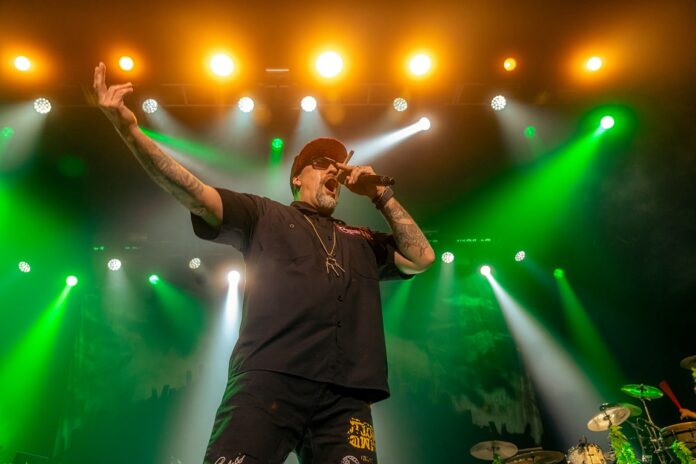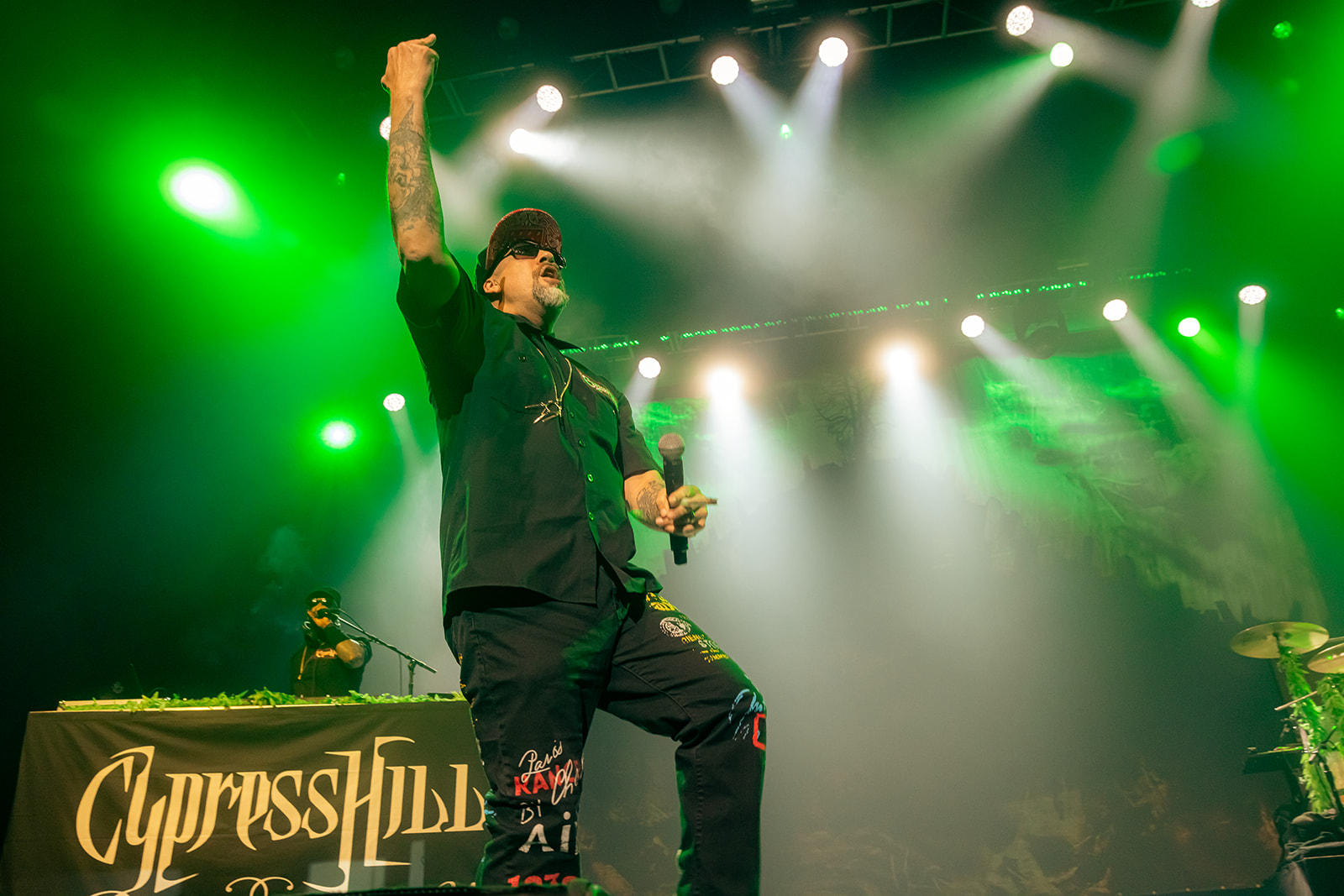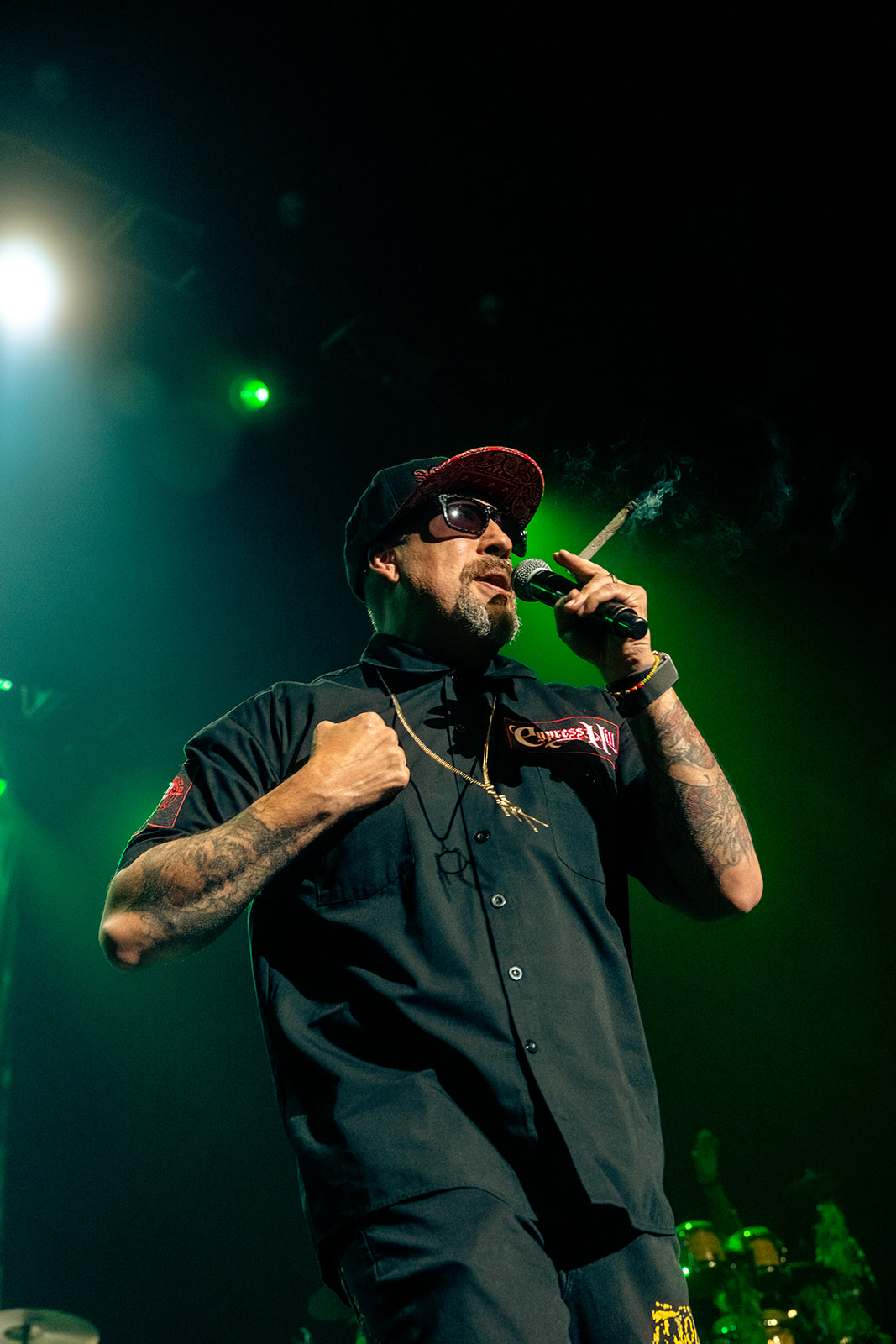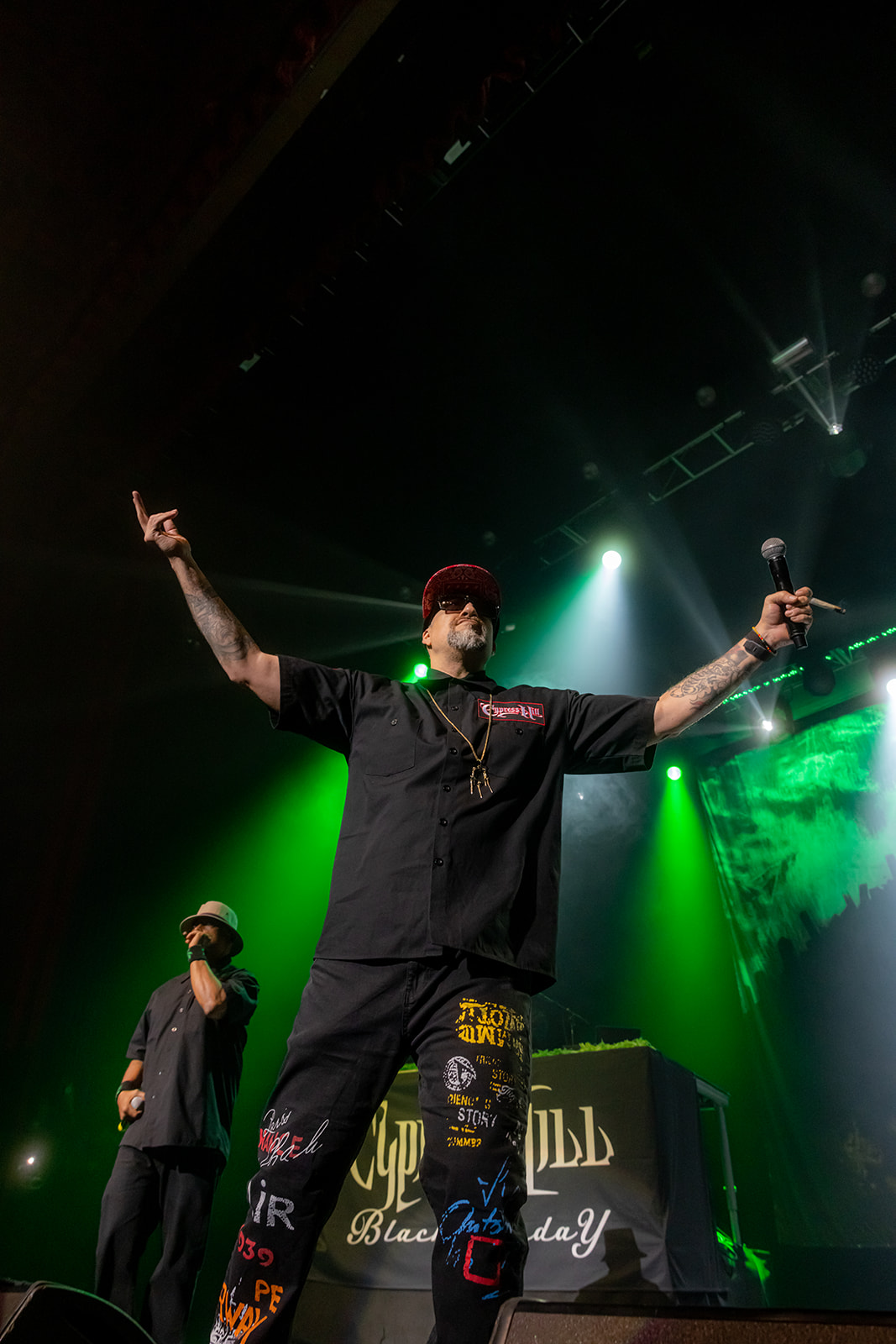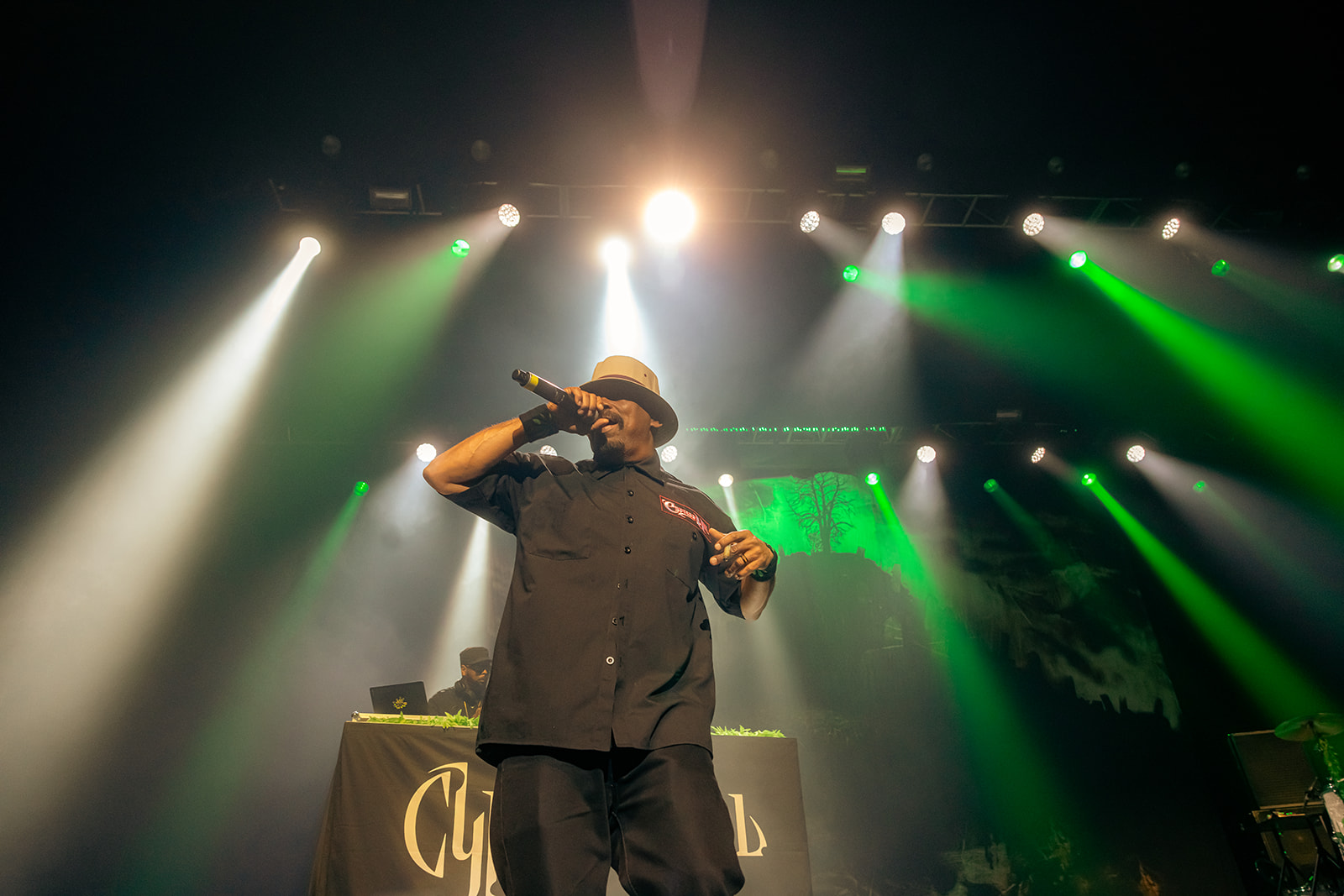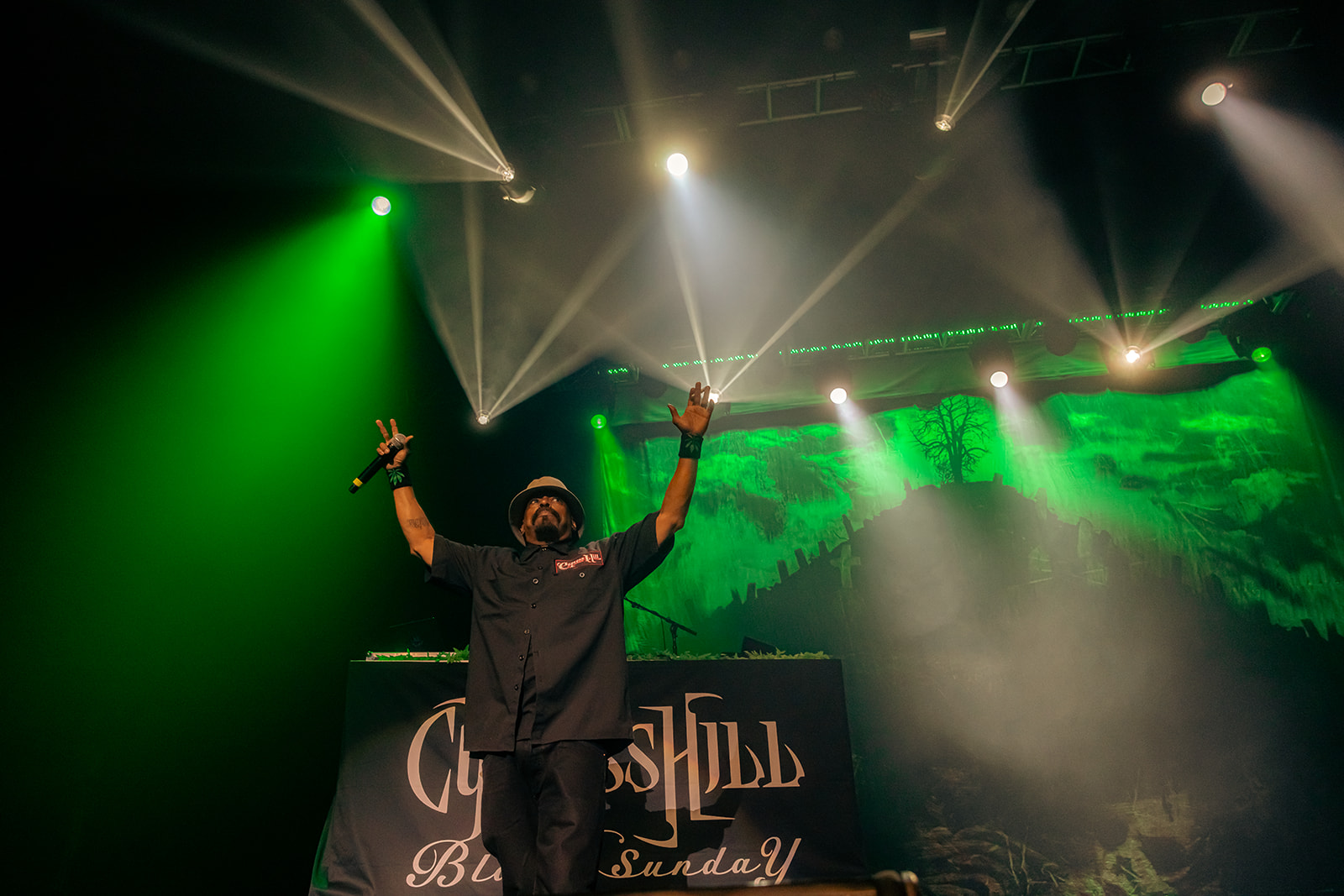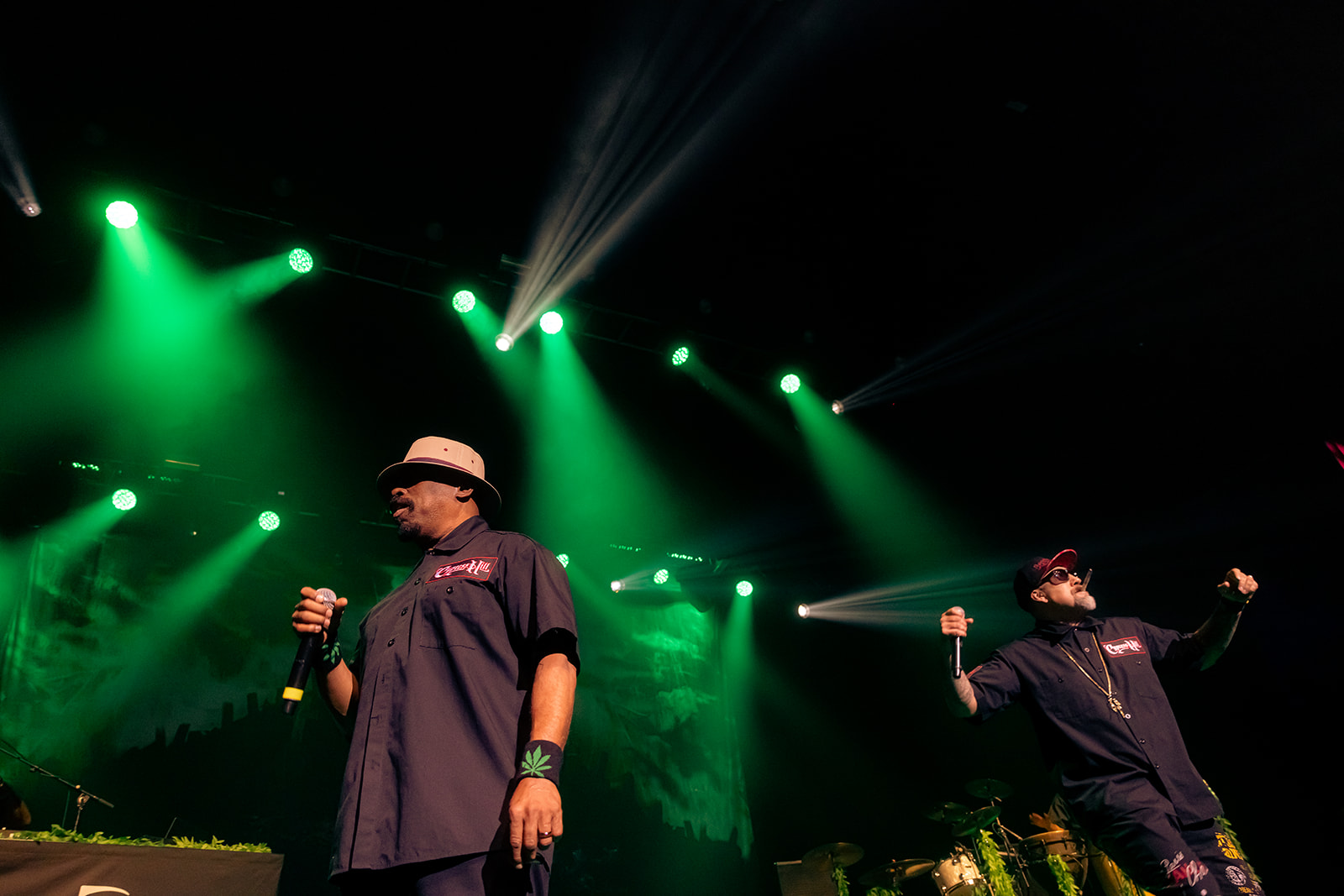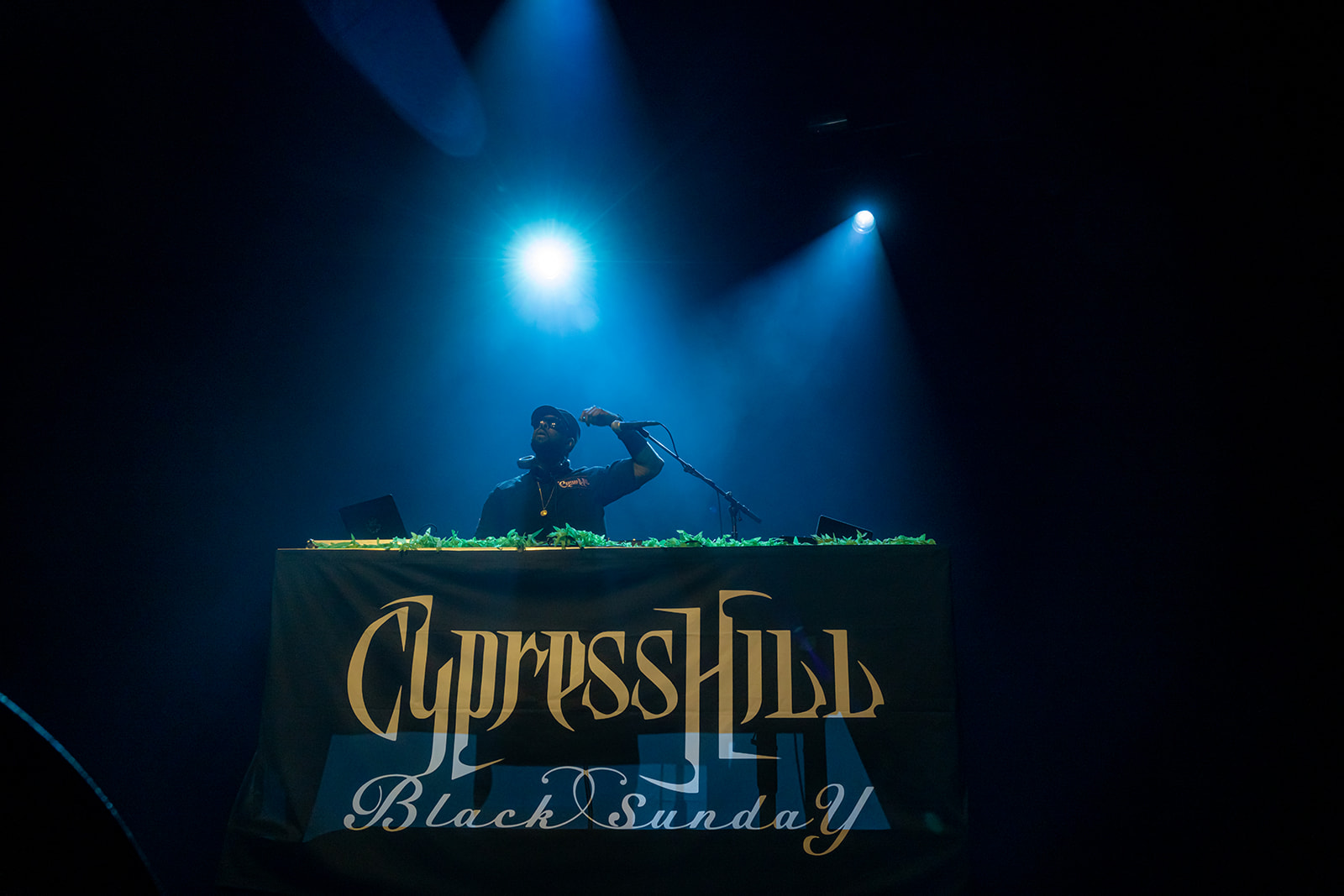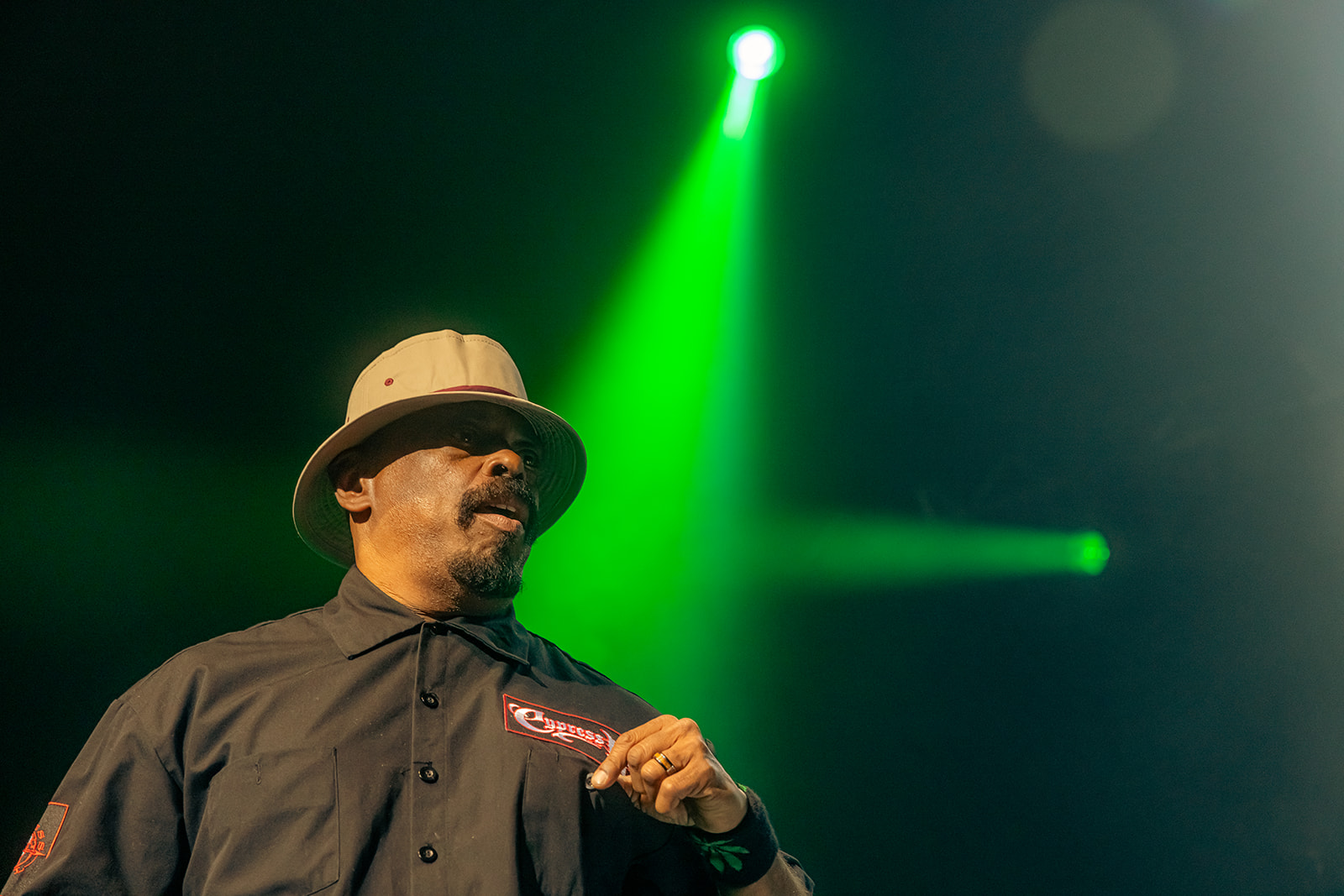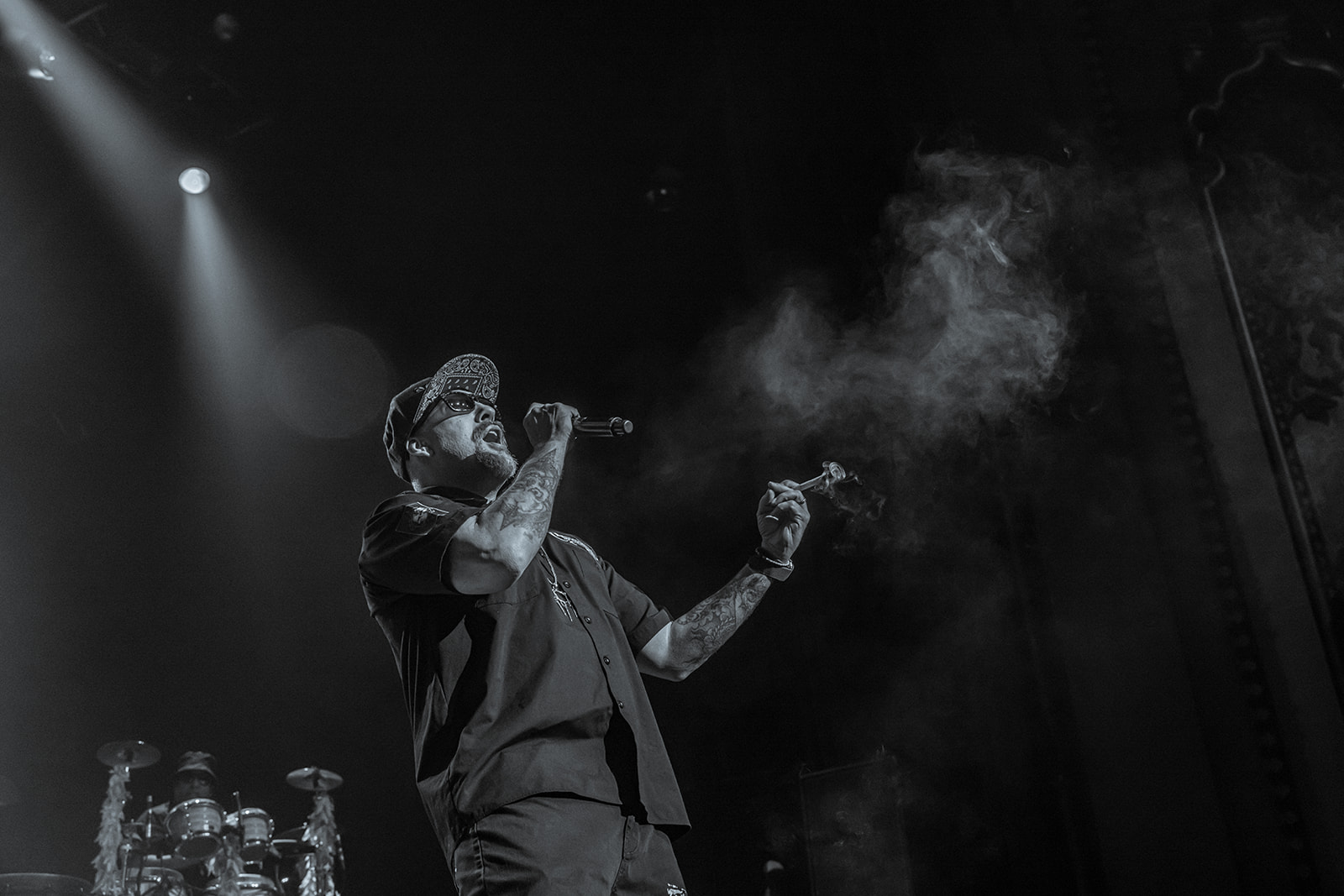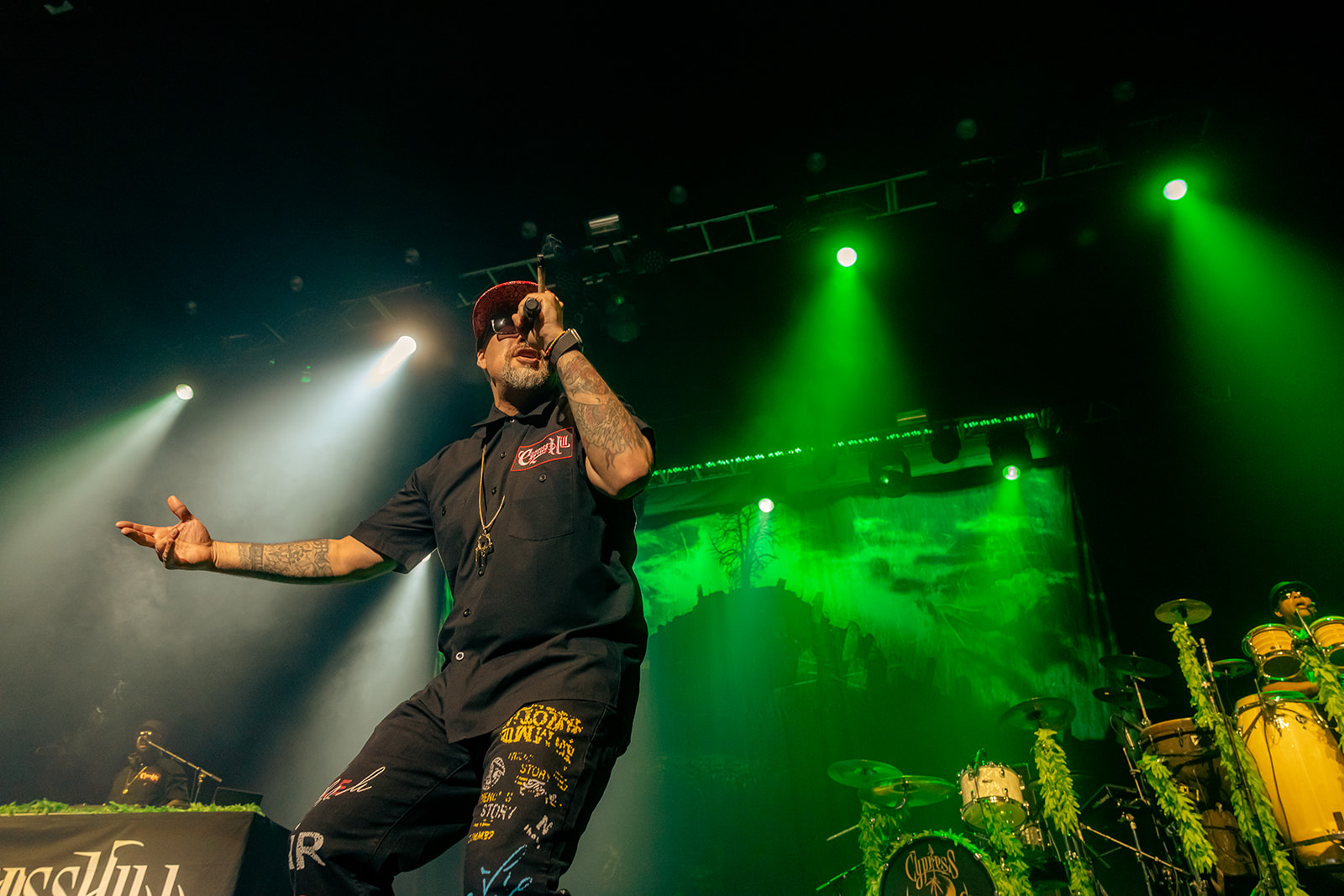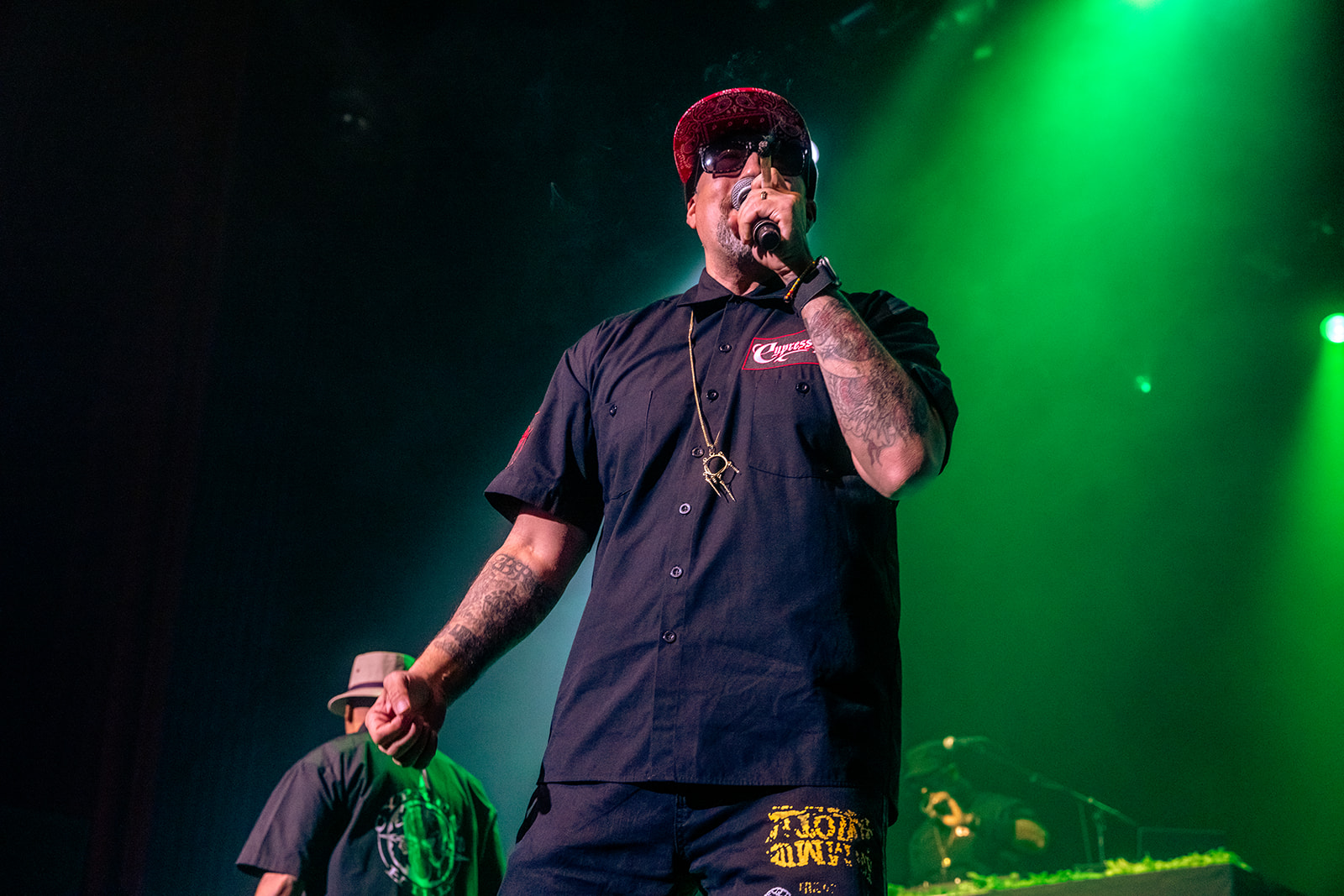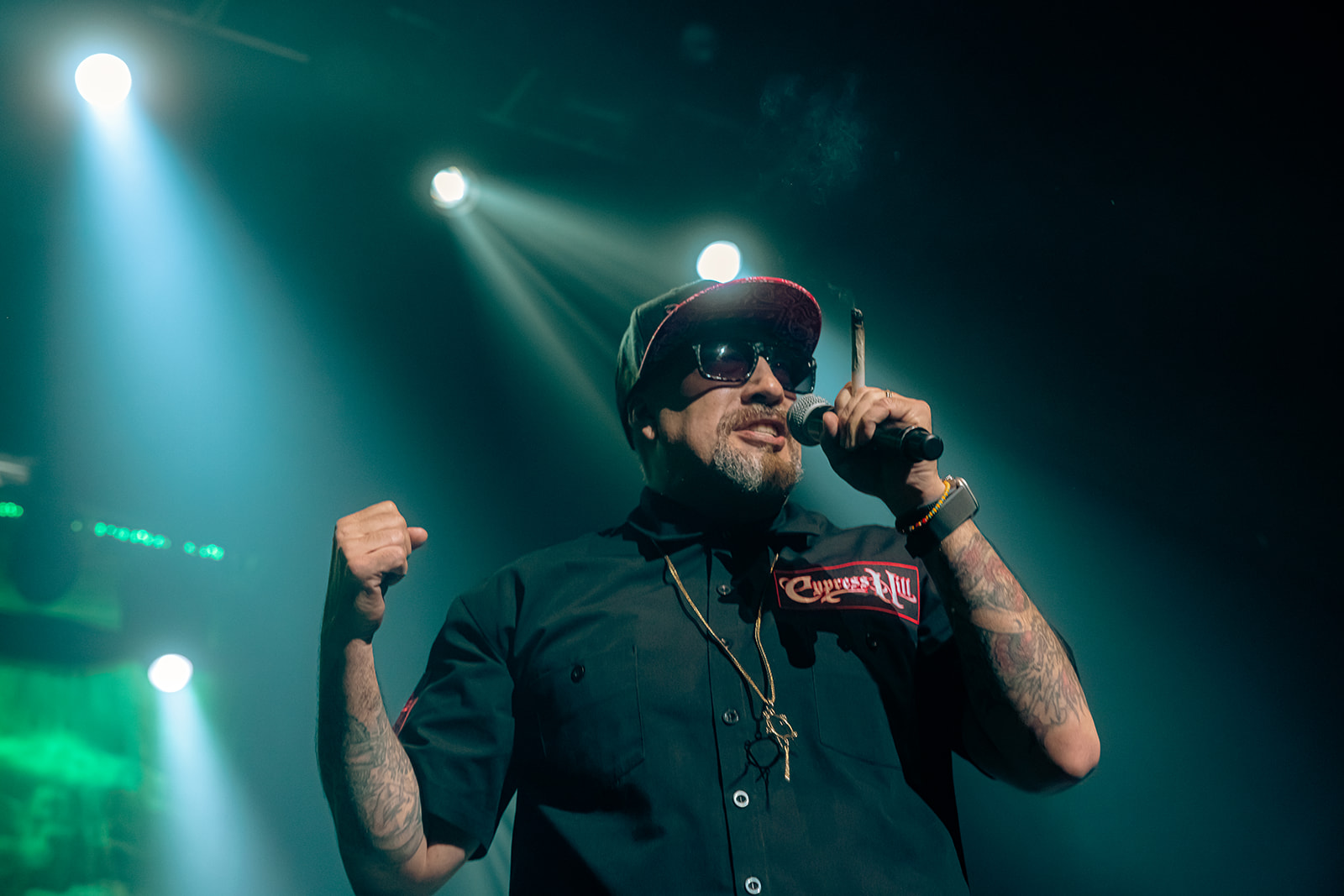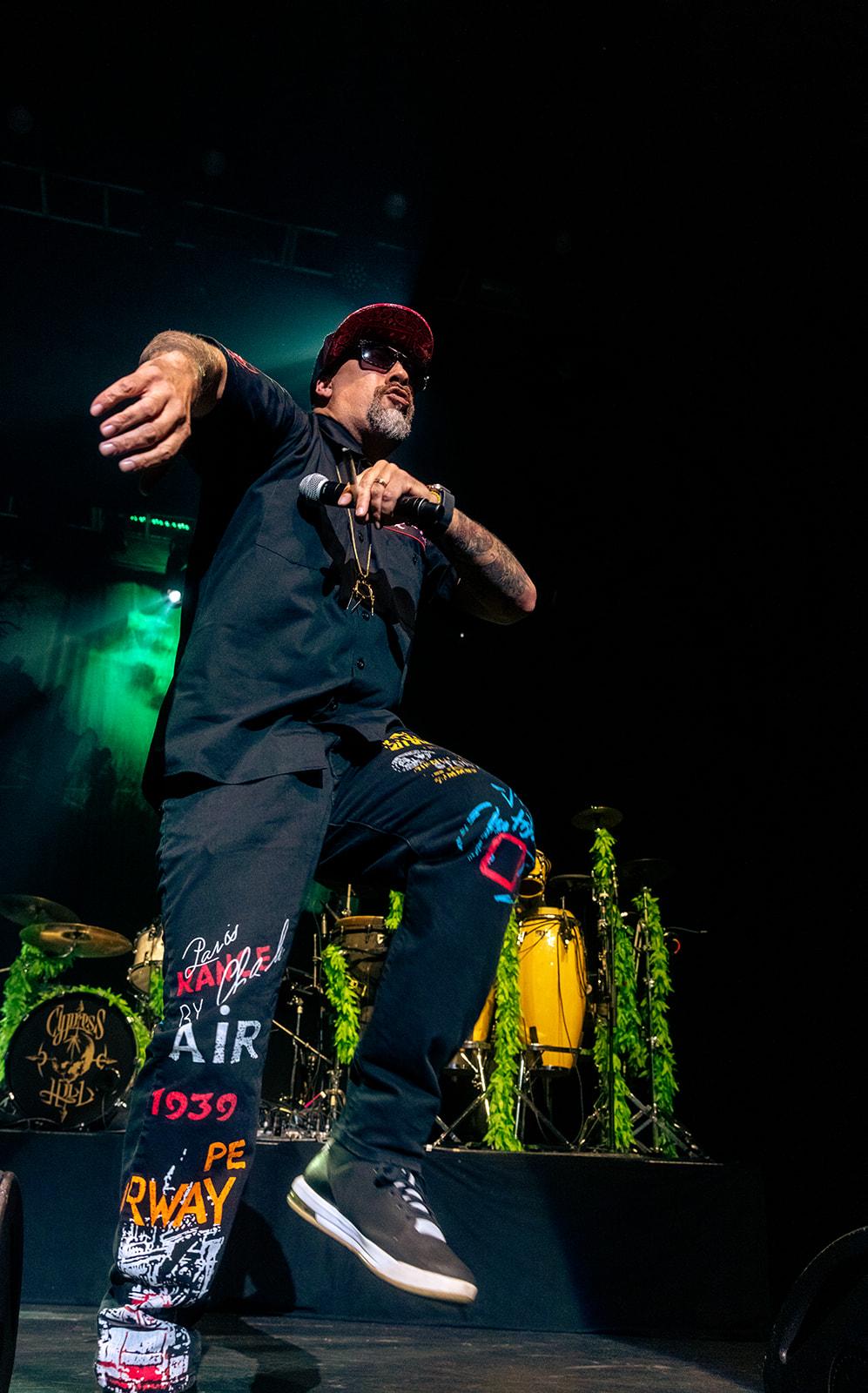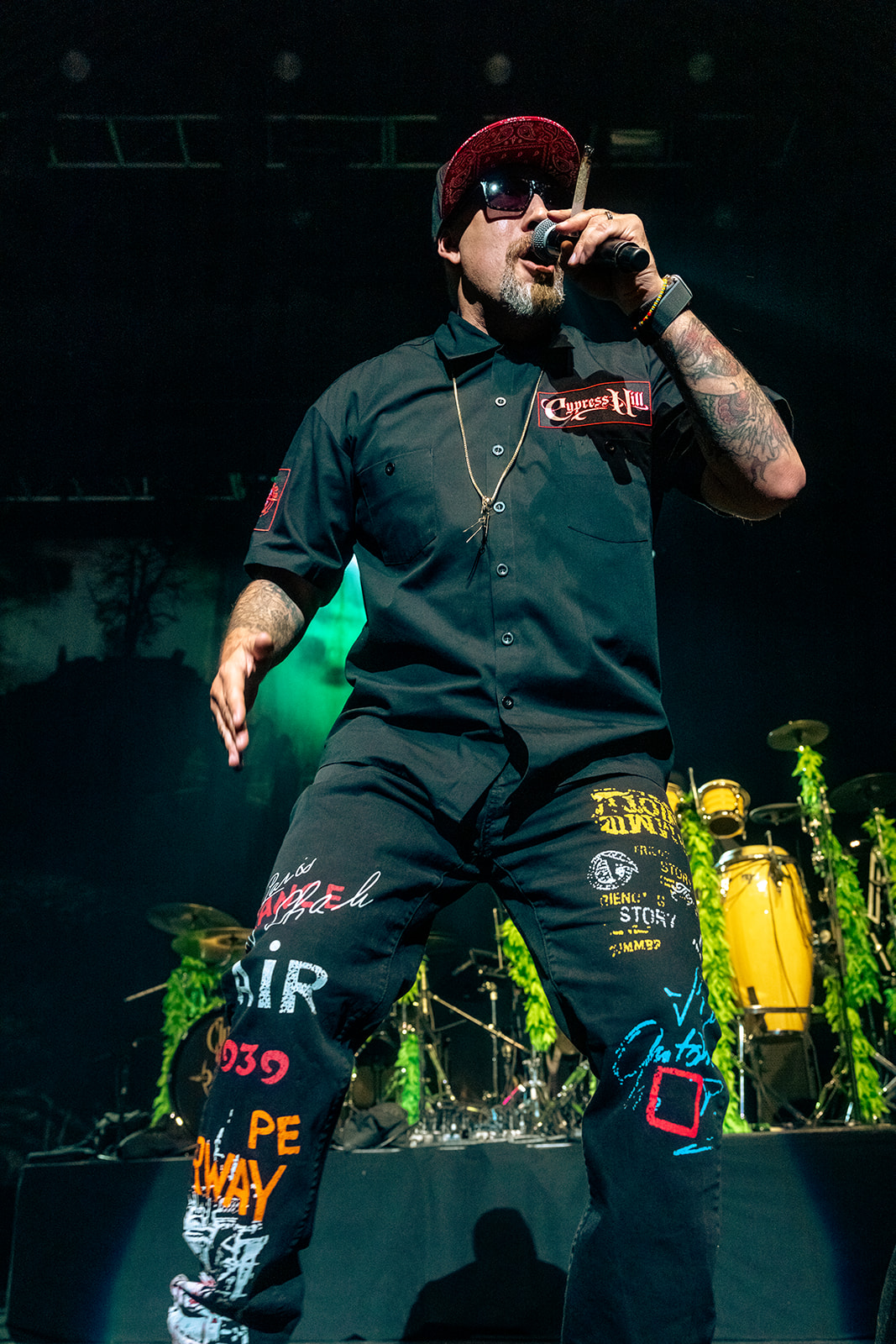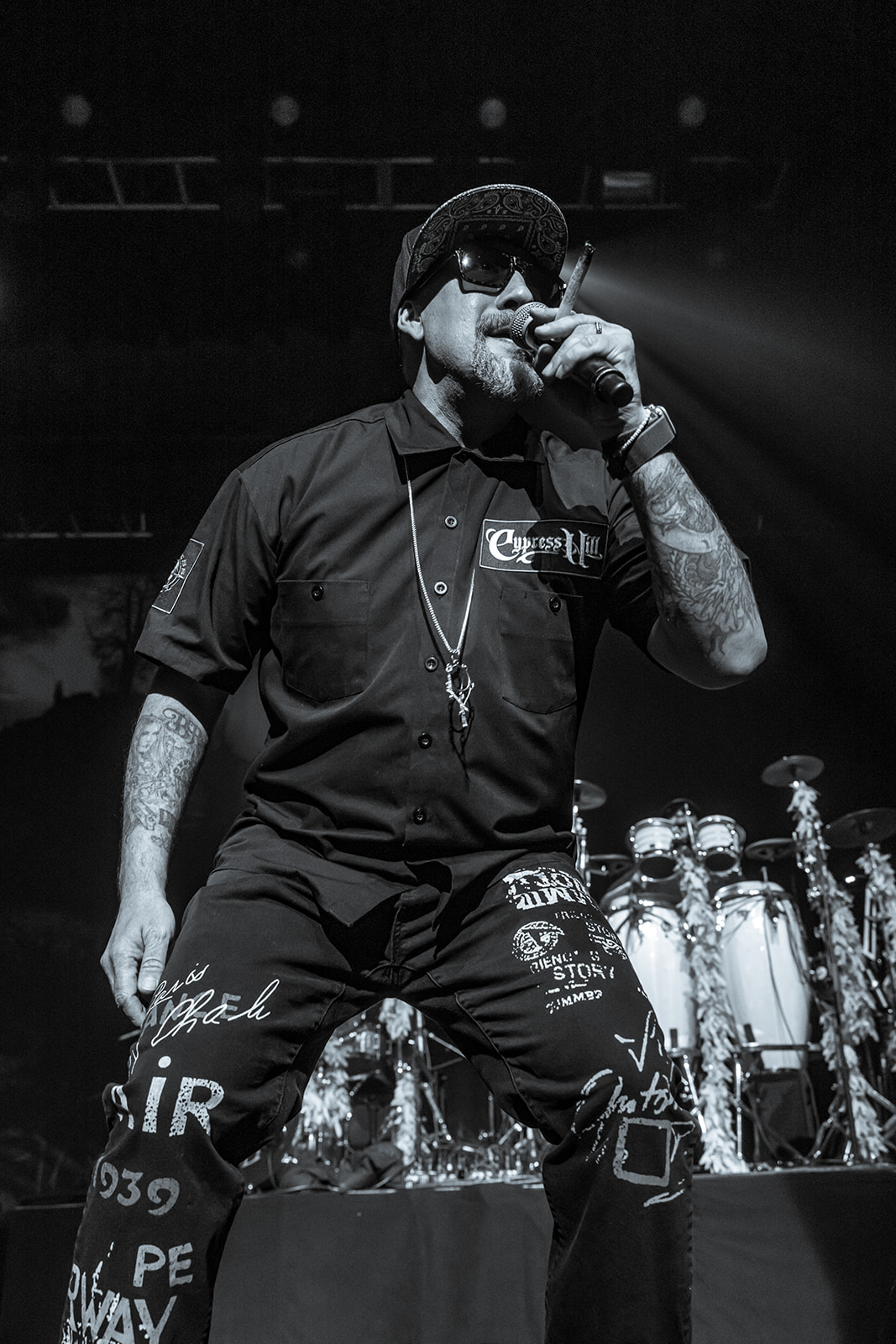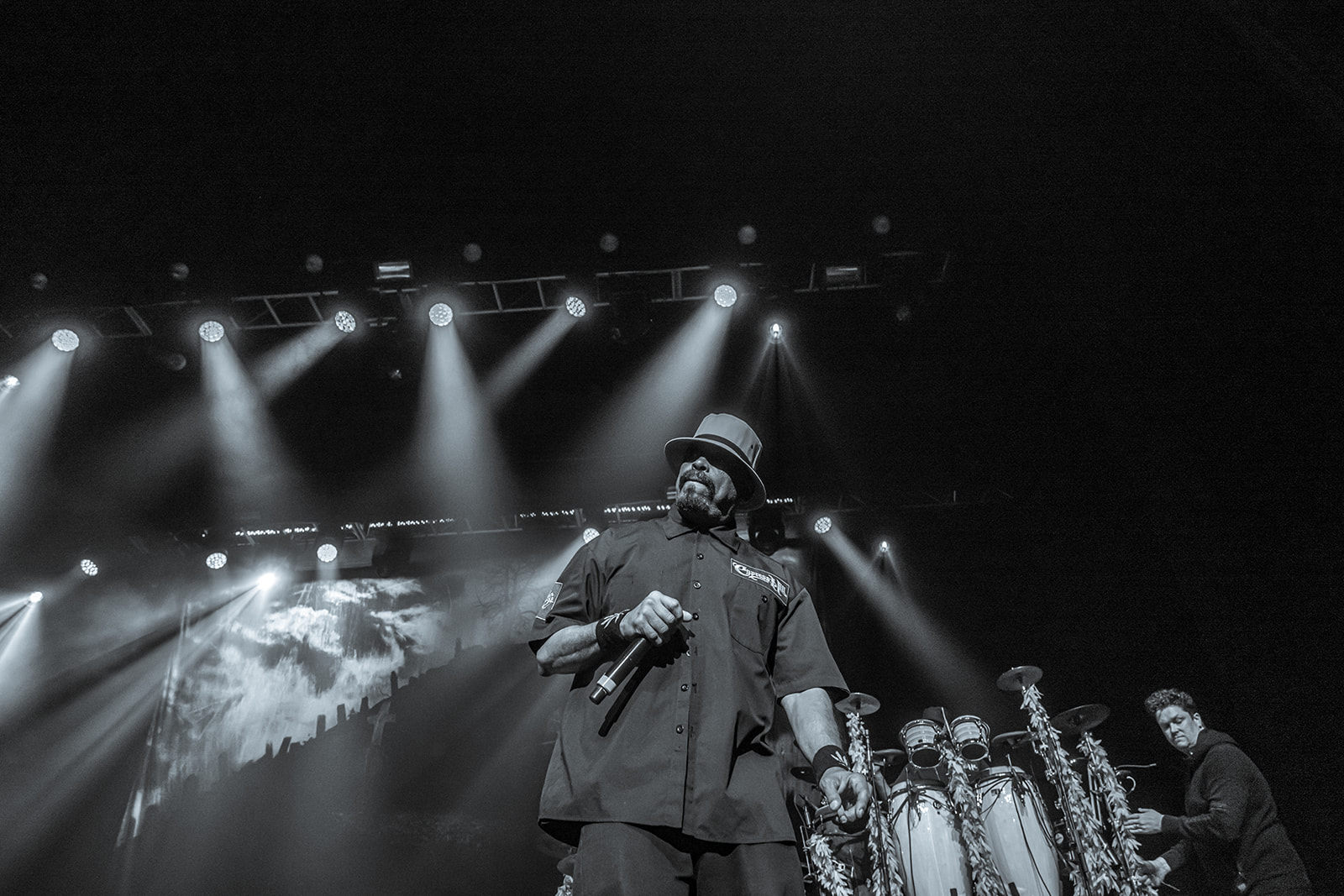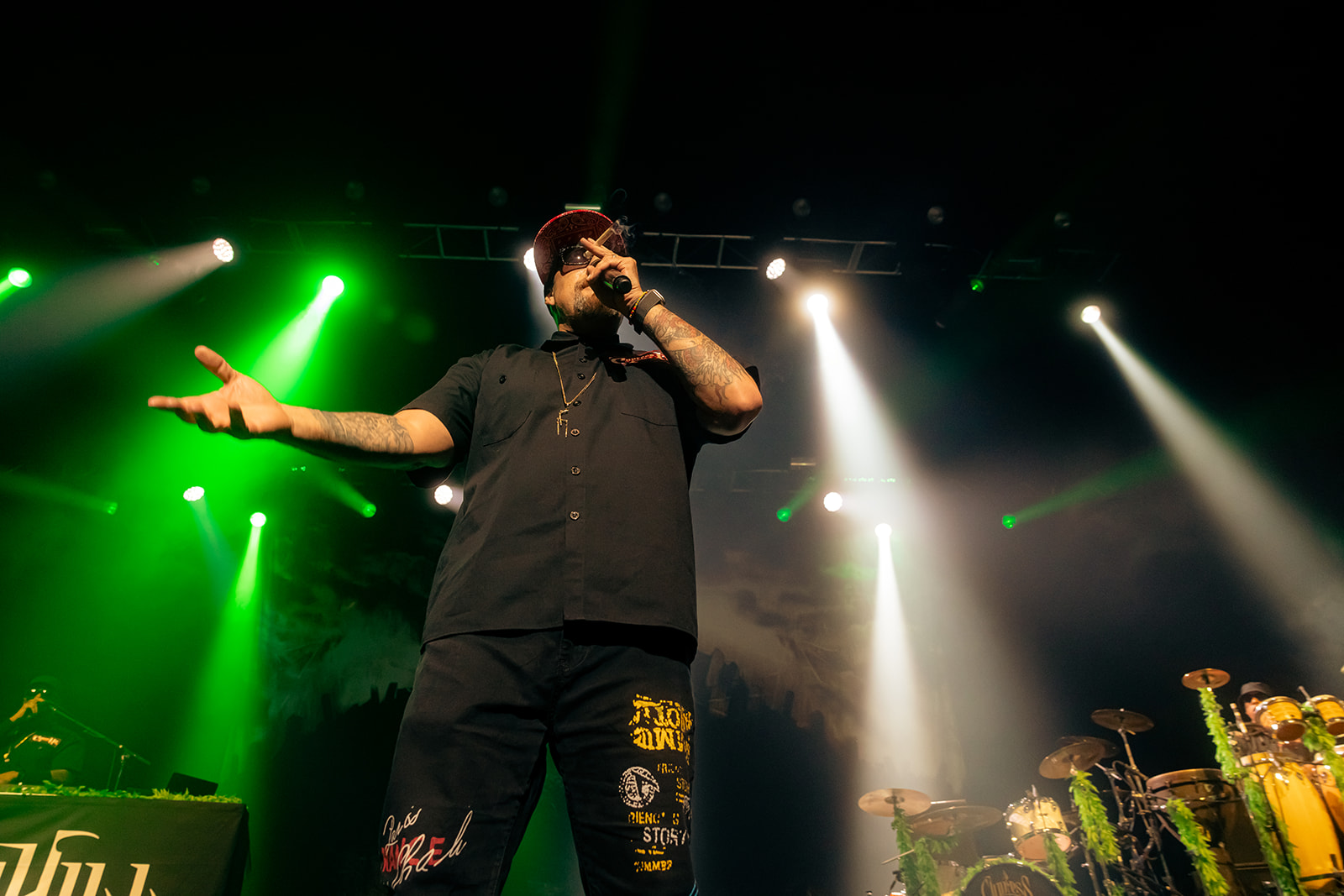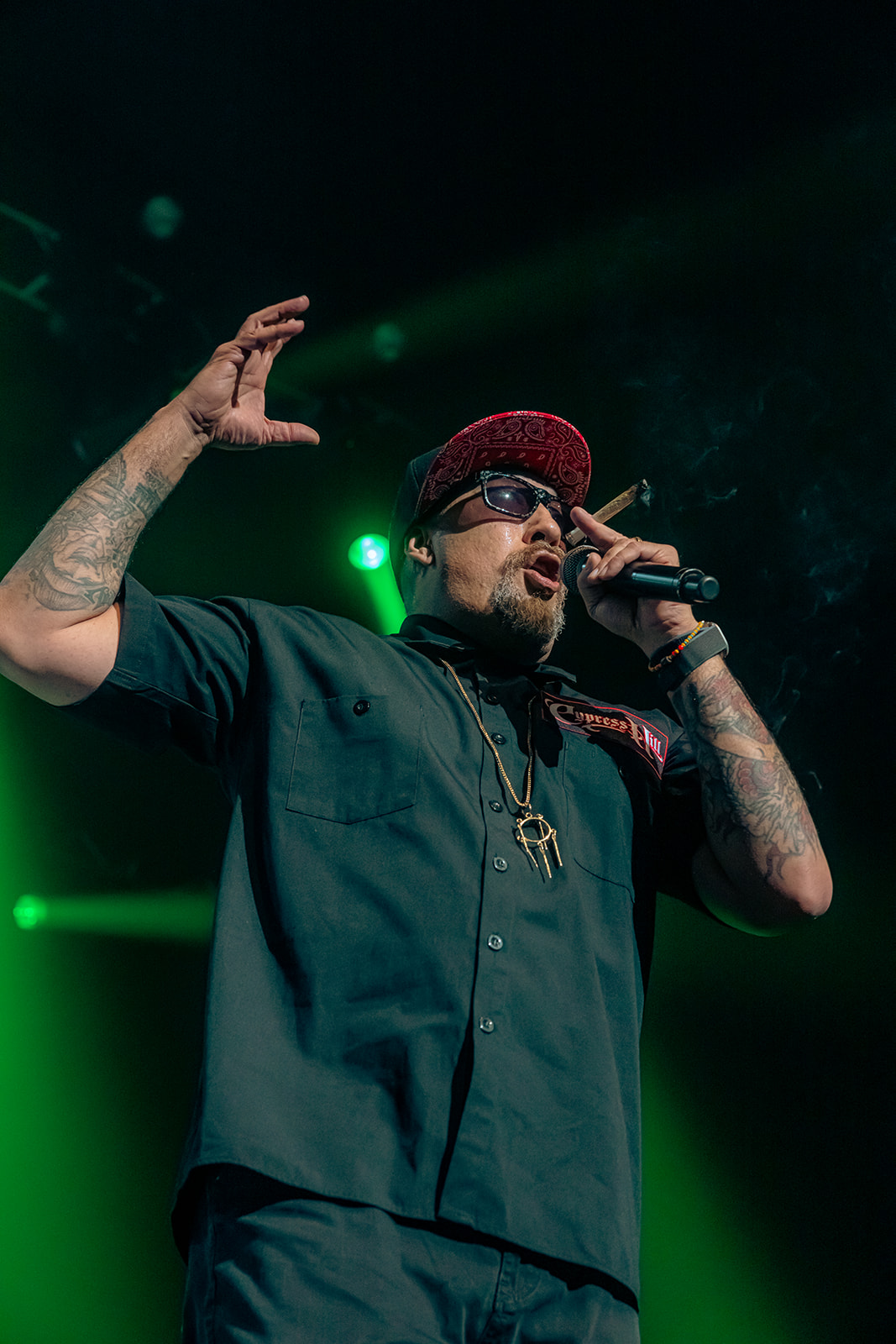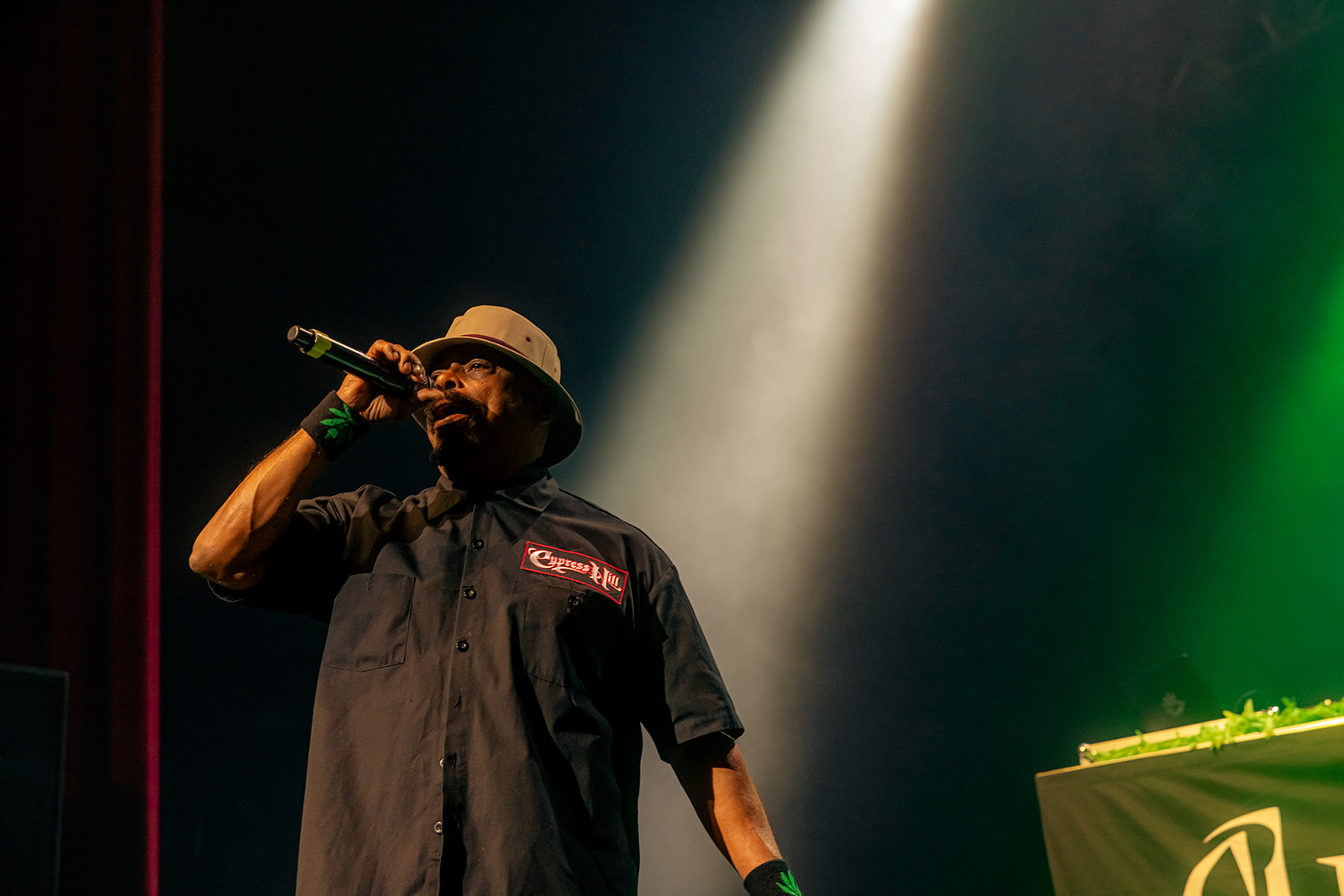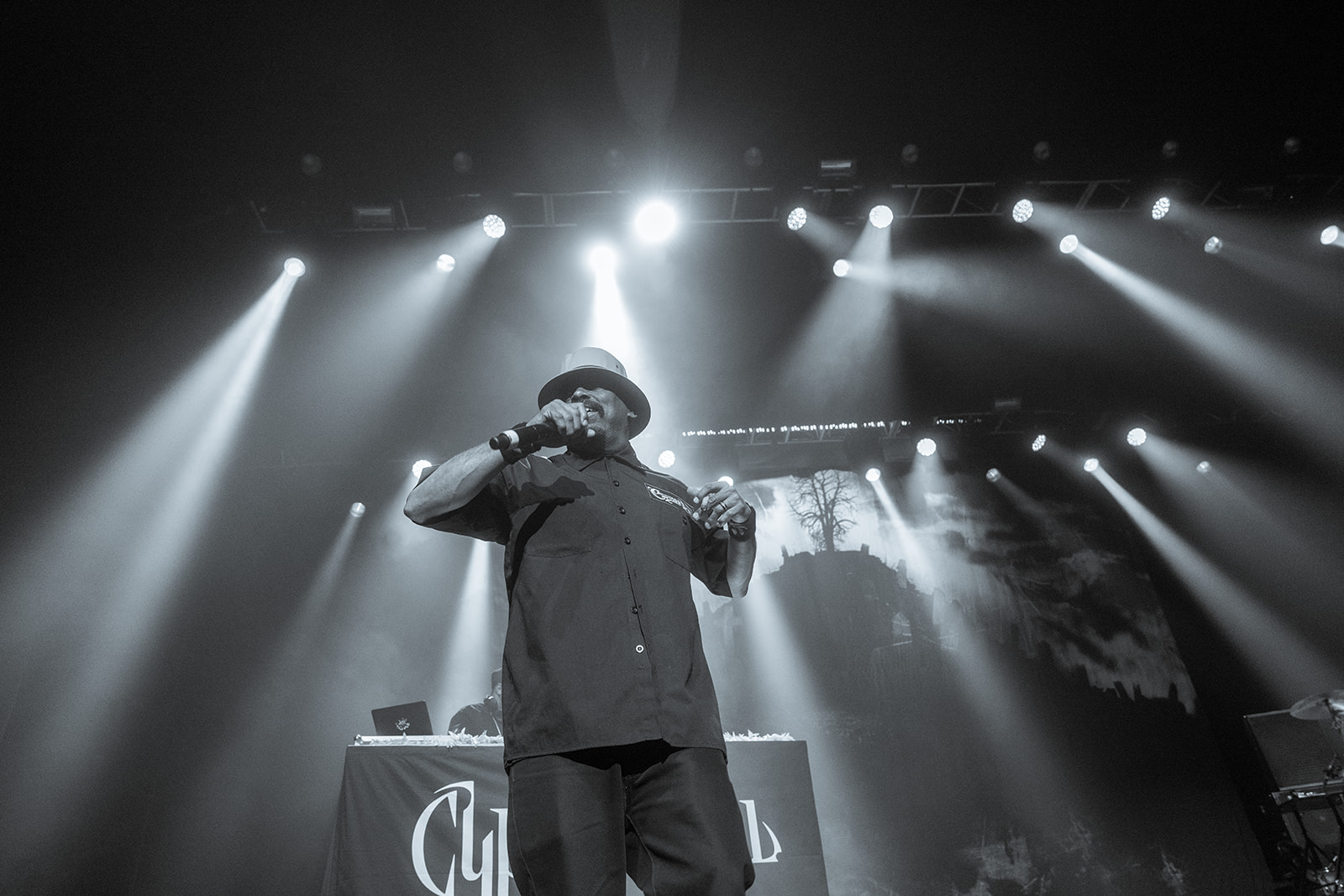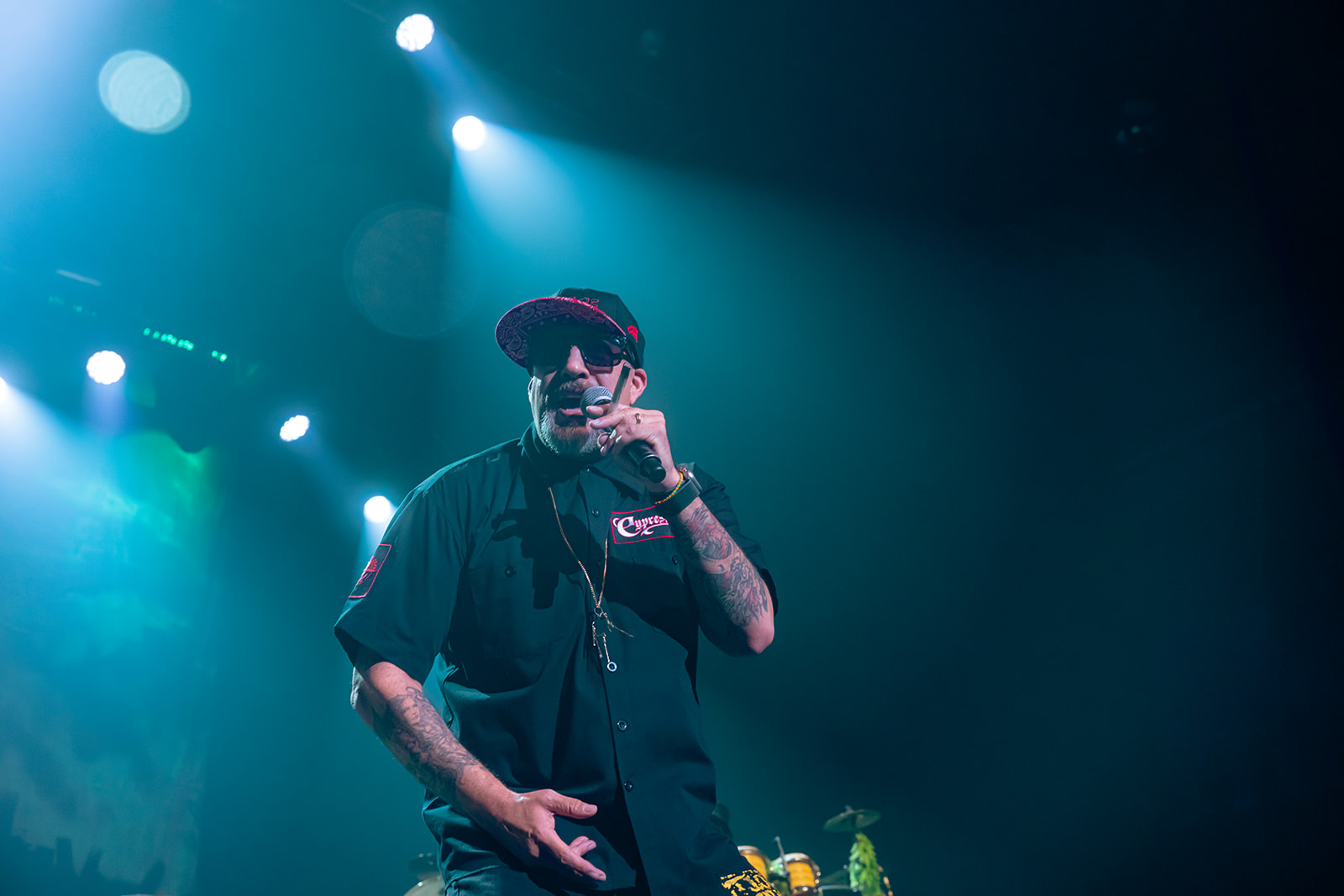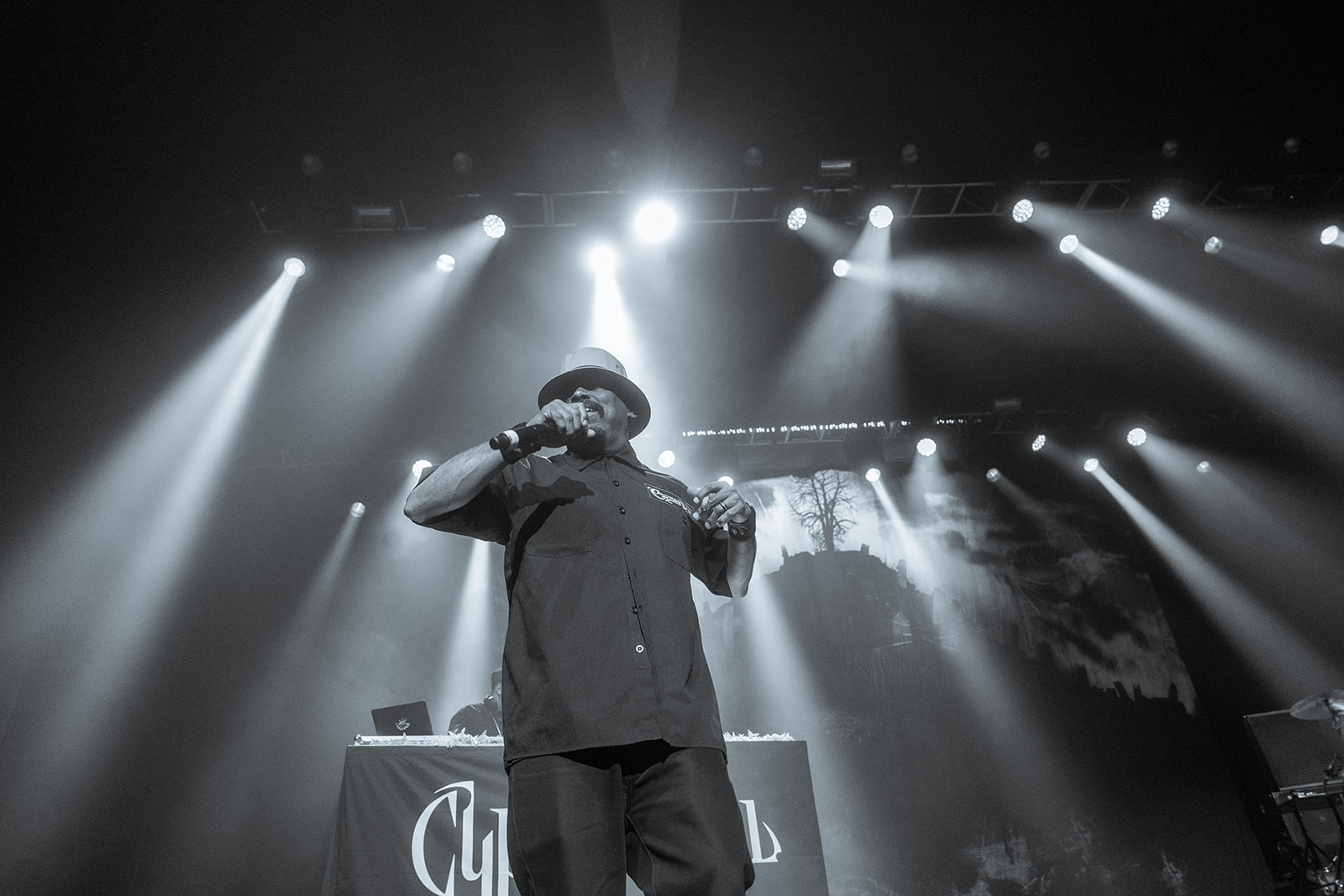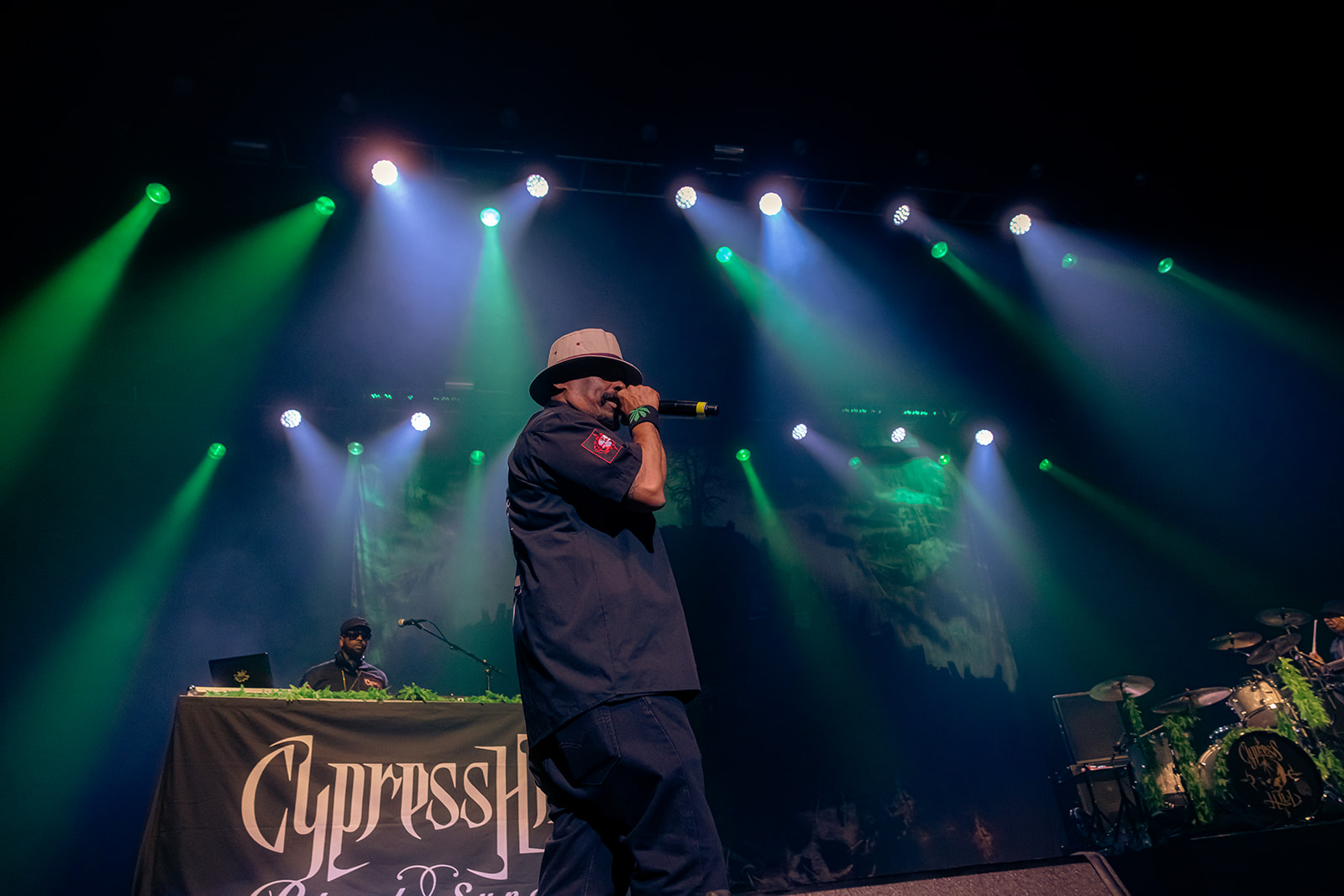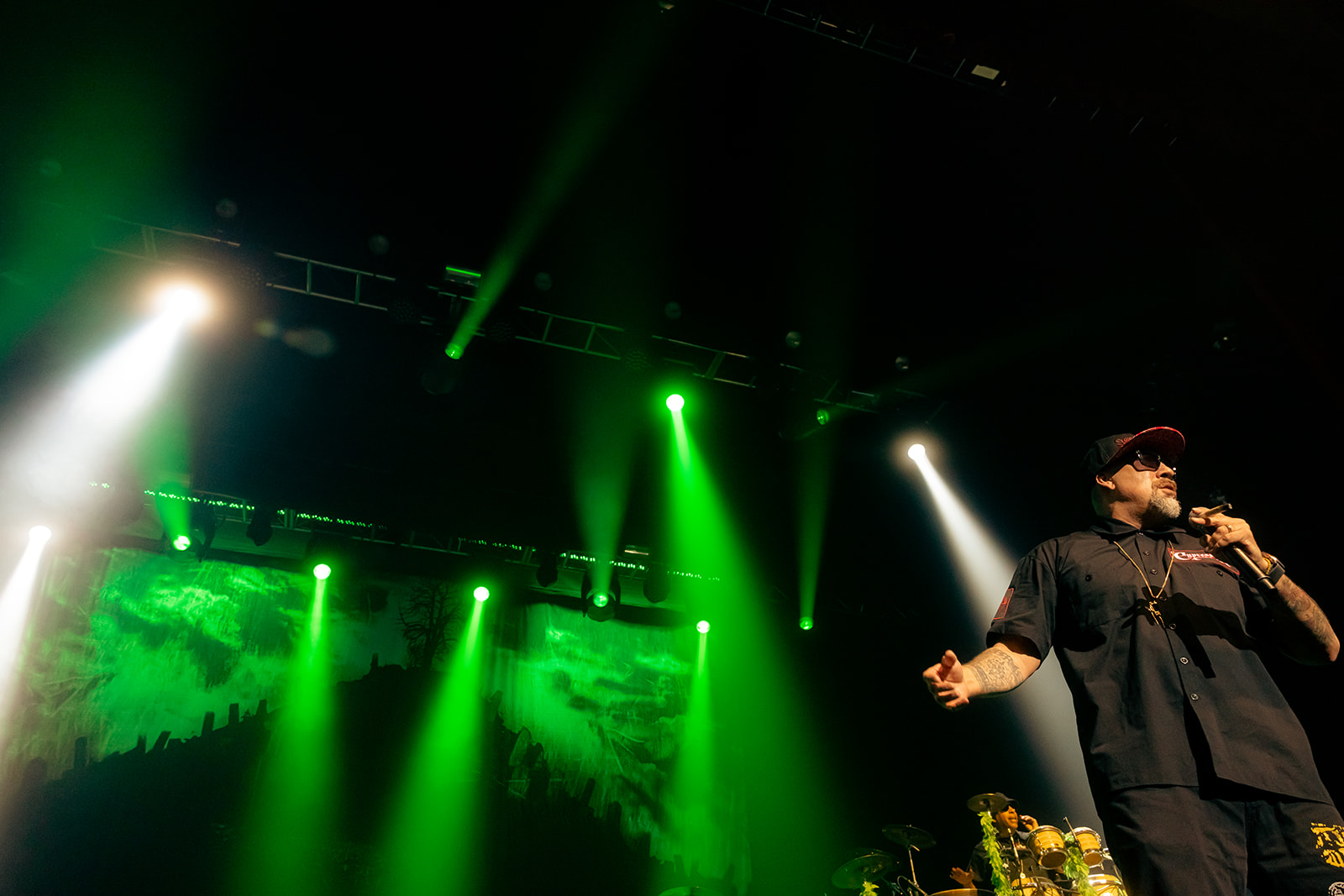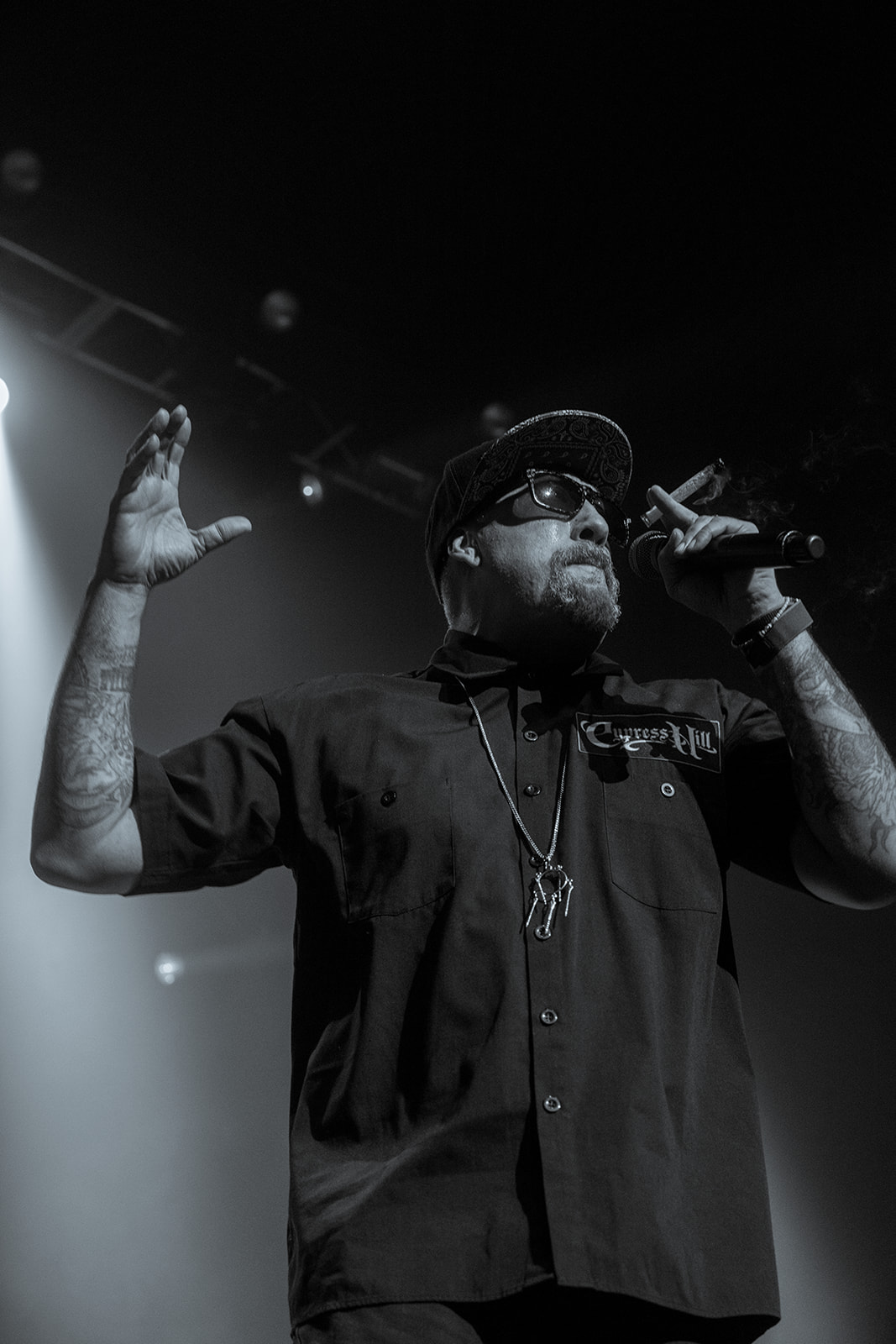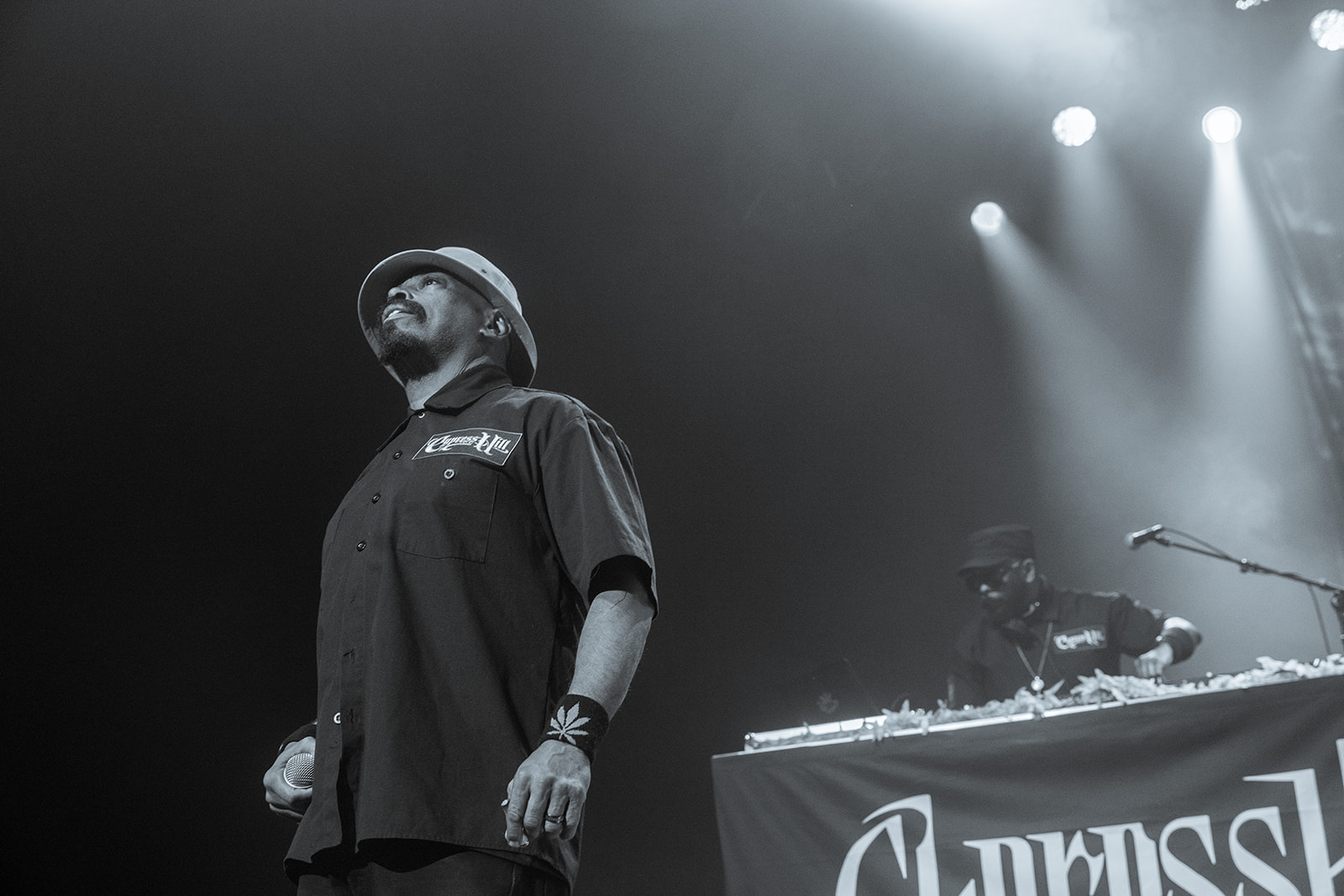When Cypress Hill smoked out the Fox Oakland on Friday October 27, the theme “Haunted Hill” was a fitting synthesis of Halloween weekend and the 30th anniversary of their monster sophomore album, Black Sunday. That 14-track record, released in 1993, helped change hip-hop’s trajectory, debuting at No. 1 on the Billboard 200 (while their 1991 self-titled debut was still in the top 10). So for hip-hop’s 50th anniversary, it was a Bay Area home-away-from-homecoming for the LA outfit as emcees B-Real, Sen Dog, percussionist Eric Bobo, and DJ Lord gave the costume-clad crowd a fat puff of the Hill’s legendary discography.
Cypress Hill may be named after a Southern California street, but their pioneering cannabis advocacy and Latino representation—to say nothing of their outsized importance in rap—has always given them roots and rowdy audiences in the Bay Area. Since the group was unapologetic about their cannabis smoking at their inception, and the racist trope Latinos aren’t marketable in the mainstream was more entrenched than it is today, the Hill was considered underground phenomena despite having their music released through a joint venture with Columbia Records; Ruffhouse Record was a new label angling for credibility and Cypress Hill immediately proved to be their barrier breakers.
Still, all the aforementioned prevented Cypress Hill from regular radio spins. Since hip-hop is a Black-led art, marketing departments couldn’t fathom Latinos’ place in it, nor could they process that Afro-Latinos like Sen Dog exist. In addition, popular fear mongering about rap music attempted to drown out Cypress Hill’s vocal FTP (fuck the police) energy.
Fans, however, understood the multitudes Cypress Hill contained, and it meant an unstoppable momentum even if it came with grim packaging. Their music has always evoked the urban gothic, with their debut single “How I Could Just Kill a Man” setting the tone. The song grew in infamy via its inclusion on the Juice (1992) film soundtrack, offering insight into the psyche of Tupac Shakur’s electric performance as the wildcard antagonist in the film. Thus, hardcore hip-hop had great expectations for Black Sunday’s release. Street-reality rhymes carved out Cypress Hill’s landmarks on the rap map because the violence found on California’s streets from Los Angeles to the Bay Area at the time needed the catharsis Cypress Hill baked into track after track.
The way the West goes, so does the country. Their signature style furthered the notion West Coast rap was the real deal, and Black Sunday’s first single kicked in the doors previously closed to them. “Insane in the Brain” became a crossover hit, and the radio stations that previously ignored them could no longer do so; MTV aired the video in regular rotation, and the song remains their most synonymous track. It had everything Cypress Hill fans needed: a bass heavy beat, amped up rhymes, that cannabis haze PTSD edge. The unique feel of so messed up it’s funny, the gallows humor the hood clings to during trying times. Its hook’s simplicity, along with B-Real’s distinct voice, made a song about psychosis a fun kid’s bop for bilingual Latin kids across hoods in America.
From their notorious skull logo to the graphic designer Jay Papke’s iconic cover art for Black Sunday (a graveyard’s hill littered with crosses and tombstones in haunting lighting), Cypress Hill’s aesthetic is at home in metal circles, promising what B-Real and Sen Dog always deliver on the mic: heavyweight rap hard-hitters. See, Black Sunday’s cover art is borderline, if not outright, blasphemous in Latino Catholic households, and that’s always been part of Cypress Hill’s appeal. Factor in their pro-cannabis facts on the album’s insert and yeah, having the record was basically contraband. Anecdotally, whoever had Black Sunday in the early-to-mid-90’s San Francisco Mission District had currency (and that had to be the case across the Bay in Oakland too). It was an album made for cruising, for smoking, for house parties, or for the select few in the life Cypress Hill reflected, for doing dirt.
The album went on to go platinum four-times over and it’s easy in retrospect to see why—the opening tracks are all clean-up hitters and it never really loses steam. “I Ain’t Goin’ Out Like That” got them a Grammy nomination, part of the critical acclaim that earned them four-star nods from Rolling Stone and The Source. Perhaps the most prescient track “Legalize It” speaks to Cypress Hills’ impact—cannabis’ medical and recreational legality is in a whole different era now, thanks in part to their cultural force of ultra-public consumption and advocacy.
As a result, it’s a song they can leave out of setlist, but their celebration of weed culture remains front and center: They opened their Oakland set, as they do so many, with a weed medley pulling from their smoke-‘em-up hits—“I Wanna Get High” and “Hits from the Bong”—before their 20-song performance treated Bay Area fans to classics like “When the Shit Goes Down,” “Illusions,” and “(Rock) Superstar.” Cypress Hill’s commitment to percussion, whether in their rock blends, rap style, or Latin flavor, pays tribute to Afro-Caribbean beats, another realm their roots and influence are frequently overlooked. So their live show makes space for Bobo to showcase his legendary lineage, and fans are treated to a deeper understanding that Cypress Hill funk goes beyond the dank in the air.
Coming off their retrospective documentary “Cypress Hill: Insane in the Brain” and their recent NPR Tiny Desk appearance, Haunted Hill in Oakland continued much-needed appreciation and celebration of Cypress Hill. The everlasting album Black Sunday, and hip-hop and cannabis culture during hip-hop’s 50th anniversary, is both a trip down memory lane and still paving the way for the present. Despite hip-hop being such a young art form, so many pioneers aren’t here to receive their flowers. Cypress Hill were the first hip-hop group to receive a star on the Hollywood walk of fame, but the culture isn’t static, and appreciation is in the live experience.
The Bay Area showed out for Cypress Hill, which embodies the collective spirit in cannabis and hip-hop—a necessary reminder because too many did not survive the street life Cypress Hill tells tales about, and too many innocent Black and Brown lives were thrown away in mass incarceration systems for partaking in the herbal remedy prescribed by “Dr. Greenthumb.”
Whether it’s the Mission District or Fillmore in San Francisco, or across the Bay in East Oakland, the hood can be a gothic experience, where guns pushed into one’s ribs lurk around the corner, knives get pulled, brawls break out with weapons consisting of whatever is near at any time. Too many funerals, too many tears. Only smoke to cope. We’ve come a long way down Cypress Hill’s psychedelic green road. Thankfully the Latinx rap pioneers are still thumping. Here’s to Cypress Hill’s Black Sunday burning one down for the next 30 years.

